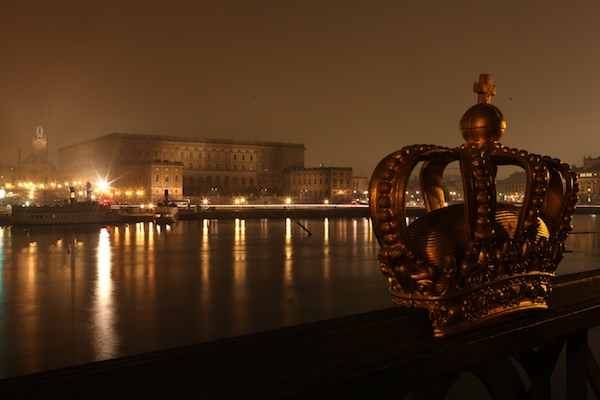I am on my first ever visit to Sweden and enjoying it greatly. My idea of this country had recently become rather confused. I used to picture it as a social democratic paradise, a tolerant, law-abiding welfare state in which everyone was a good and caring citizen. But then came the Wallander television series and the Stieg Larsson books and films in which Sweden was portrayed as a country in which violent crime was rife and corruption, sadism and perversion held sway.
The reality, as I have experienced it over the past few days, has neither upheld nor discredited either of these stereotypes. But this is hardly surprising, since I am here as a member of a small group of discerning English tourists led by my estimable Northamptonshire neighbour Lord Charles FitzRoy, whose company, Fine Arts Travel, correctly claims to offer ‘privileged access to the most beautiful private houses in Europe’. So we haven’t spent much time with ordinary folk.
If, like me, you have never been to Sweden before, the grandeur of its royal palaces comes as a surprise. The 18th-century Royal Palace in the centre of the city, with its 608 rooms, is far bigger than Buckingham Palace. And while the King and Queen of Sweden don’t actually reside there any more (they use it as an office and to host important visitors like Prince Charles), they do still live at Drottningholm Palace, the royal family’s 17th-century country retreat on the island of Lovön, an hour’s boat ride from Stockholm, which is breathtaking in its splendour.
We tend to forget that neutral, peace-loving Sweden was once a great European power, which in the 17th century conquered an empire that stretched as far south as Prague. Having arrived rather late in the day at the top table of European royalty, its warrior kings wanted their palaces to reflect their new exalted status and, like upstart Russian oligarchs today, rather overdid it. Drottningholm, now a Unesco world heritage site, was designed like Versailles to impress on people the glory of the monarchy; and while it may not be as large as Versailles, there is no royal residence in Britain to compare with it in opulence.
It seems something of a paradox that a country so wedded to social democratic ideals of equality and fairness should at the same time tolerate a monarchy on this scale. But polls show the Swedes to be almost as keen on their monarchy as we are on ours. This must be because the Swedish royals are personally so modest. King Carl XVI is a dyslexic car enthusiast whose wife, Queen Silvia, is half-German and half-Brazilian, with a 17th-century Amerindian chief as an ancestor. The Crown Princess Victoria is married to her personal trainer. Like the Swedes in general, the royals are down-to-earth and don’t believe in fairy tales. But the spectacular grandeur of the Stockholm City Hall, in which the annual Nobel Prize banquet for 1,300 people is held, suggests eagerness by at least one democratic institution not to be outshone by the monarchy.
It is lucky that practically everybody in Stockholm speaks English; for the Swedish language, descended from Old Norse, the language of the Vikings, is impenetrable. I went to the première of a new production of Benjamin Britten’s Peter Grimes at the Royal Opera House, which was sung in English with Swedish surtitles, and I struggled in vain to relate any of the surtitles to the words that were being sung. It was only at the end, when a surtitle read ‘Adjö, Peter’, that I guessed that Grimes was going off to scuttle his fishing-boat and wouldn’t be seen again.
I don’t know why the Swedes require so many umlauts and other squiggles to tell them how to pronounce their vowels, but they make the written language look particularly daunting. And then it seems odd that a supposedly Germanic language should contain so few words that resemble any from other languages beyond Scandinavia. And when you do recognise a word, it is usually spelt in a perversely peculiar way. Thus the word for ‘parking’ is ‘parkering’, the word for ‘restaurant’ is ‘restaurang’, and the word for ‘menu’ is ‘meny’. ‘Bus’ is ‘buss’, ‘up’ is upp, and so on, all for no reason one can understand.
By the door leading out of a tourist gift shop at Drottningholm there is a sign with the single word ‘Skum’ boldly printed on it. On enquiry, I found that this wasn’t, as I had feared, a derogatory description of tourists such as myself but a word meaning ‘foam’ to alert people to the presence of a fire extinguisher. I shouldn’t have suspected an insult, however apt, for the Swedes are scrupulously polite.






Comments